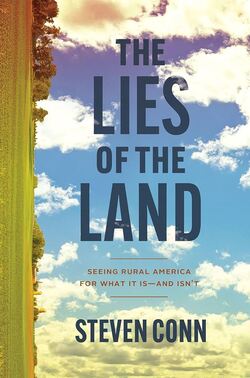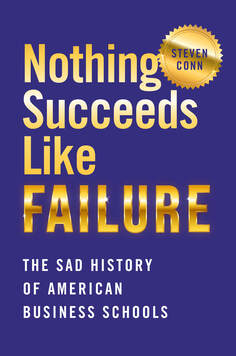The Lies of the Land: Seeing Rural America for What It Is-- and Isn't
|
It seems everyone has an opinion about rural America. Is it gripped in a tragic decline? Or is it on the cusp of a glorious revival? Is it the key to understanding America today? Steven Conn argues that we’re missing the real question: Is rural America even a thing? No, says Conn, who believes we see only what we want to see in the lands beyond the suburbs—fantasies about moral (or backward) communities, simpler (or repressive) living, and what it means to be authentically (or wrongheadedly) American. If we want to build a better future, Conn argues, we must accept that these visions don’t exist and never did.
"Underlying the country’s red state–blue state polarization is a more profound, and widening, rural-urban split...A piercing, unsentimental new book [argues that] understanding it will require setting myths aside and grappling with what the rich and the powerful have done to rural spaces and people. Such demystification, Conn rightly insists, is long overdue." --The New Yorker "Conn takes our ideal small town where white Americans cherish hard work and independence from subsidies, along with religious and traditional family values, and shows it to be a nostalgic myth. The Lies of the Land is a powerful book... but perhaps most importantly, his description of rural America as a hard place to make a living shows that it is a much more complex and interesting space than our myth ever allowed." --Newcity Available from The University of Chicago Press |
Nothing Succeeds Like Failure: The Sad History of American Business Schools
|
"An exceptionally informed, iconoclastic, and thought-provoking read throughout...unique and unreservedly recommended..."
-Midwest Book Review "Provocative" -Forbes.com "Historian Steven Conn has produced a gleeful roast of the American business school." -History of Education Quarterly Available from Cornell University Press |
Americans Against the City: Anti-Urbanism in the Twentieth Century
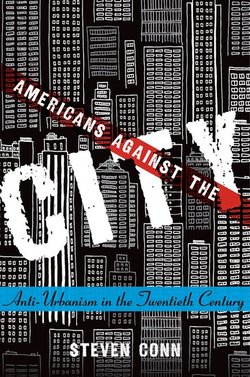
Oxford University Press
"In his new book, “Americans Against the City: Anti-Urbanism in the Twentieth Century,” Steven Conn, a historian at Ohio State University, offers a deep history of that impulse in America, with some surprising twists—tracking how the 18th-century New England village has done time as an anti-urban poster child, and how the federal government has periodically invested large sums in projects intended to decentralize the population."
-Rebecca Onion, The Boston Globe
Americans Against the City: Anti-Urbanism in the Twentieth Century has been listed as one of the top 10 books for the year of 2015 by PLANETIZEN!
Check it out at: http://www.planetizen.com/node/72738/top-10-books-2015
"In his new book, “Americans Against the City: Anti-Urbanism in the Twentieth Century,” Steven Conn, a historian at Ohio State University, offers a deep history of that impulse in America, with some surprising twists—tracking how the 18th-century New England village has done time as an anti-urban poster child, and how the federal government has periodically invested large sums in projects intended to decentralize the population."
-Rebecca Onion, The Boston Globe
Americans Against the City: Anti-Urbanism in the Twentieth Century has been listed as one of the top 10 books for the year of 2015 by PLANETIZEN!
Check it out at: http://www.planetizen.com/node/72738/top-10-books-2015
To Promote the General Welfare: The Case For Big Government
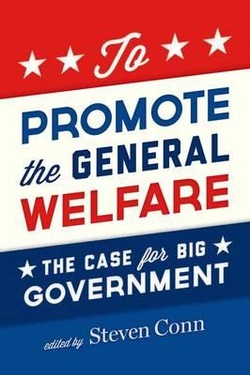
Oxford University Press
"One of the greatest secrets of American history is that Americans have from the very beginning relied on government to improve their nation, help it grow, and make it more just. An energetic government is not simply consistent with keeping our country free, but actually essential to expanding our liberties and our personal possibilities. The authors make their arguments so clearly and so well that Tea Party members willing to grapple with To Promote the General Welfare might find themselves changing their minds. This is an excellent book that is also perfectly matched with our political moment."
-E.J. Dionne, author of Our Divided Political Heart: The Battle for the American Idea in an Age of Discontent
"One of the greatest secrets of American history is that Americans have from the very beginning relied on government to improve their nation, help it grow, and make it more just. An energetic government is not simply consistent with keeping our country free, but actually essential to expanding our liberties and our personal possibilities. The authors make their arguments so clearly and so well that Tea Party members willing to grapple with To Promote the General Welfare might find themselves changing their minds. This is an excellent book that is also perfectly matched with our political moment."
-E.J. Dionne, author of Our Divided Political Heart: The Battle for the American Idea in an Age of Discontent
Do Museums Still Need Objects?
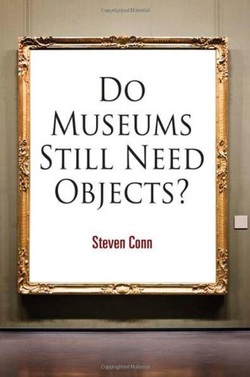
University of Pennsylvania Press
"Steven Conn offers a refreshing look at museums and many of the debates surrounding their development and practices over the past forty years. He is right to frame his inquiry by asking if museums still need objects. Too often these debates have ignored the very characteristic that defines museums and distinguishes them from all other cultural institutions: they collect, preserve, and present things. This is an important, timely book."
—James Cuno, President and CEO of the J. Paul Getty Trust
"Steven Conn offers a refreshing look at museums and many of the debates surrounding their development and practices over the past forty years. He is right to frame his inquiry by asking if museums still need objects. Too often these debates have ignored the very characteristic that defines museums and distinguishes them from all other cultural institutions: they collect, preserve, and present things. This is an important, timely book."
—James Cuno, President and CEO of the J. Paul Getty Trust
Metropolitan Philadelphia
University of Pennsylvania Press
"Steven Conn's book is just a delight. It is beautifully researched and written. It is meditative and soulful. Why is Philadelphia great? Why is it so special? Why must it be preserved? Conn's book, presented with clarity and affection, makes the best case for the city I have read in a very long time. Quakerism. Clark Park. William Penn. Pearl Buck. The city mural program. The orchestra. The zoo. Conn has tied together all the different roots and traditions and institutions of the Philadelphia region together in a wonderful package."
—Buzz Bissinger, author of A Prayer for the City and Friday Night Lights
"Steven Conn's book is just a delight. It is beautifully researched and written. It is meditative and soulful. Why is Philadelphia great? Why is it so special? Why must it be preserved? Conn's book, presented with clarity and affection, makes the best case for the city I have read in a very long time. Quakerism. Clark Park. William Penn. Pearl Buck. The city mural program. The orchestra. The zoo. Conn has tied together all the different roots and traditions and institutions of the Philadelphia region together in a wonderful package."
—Buzz Bissinger, author of A Prayer for the City and Friday Night Lights
History's Shadow
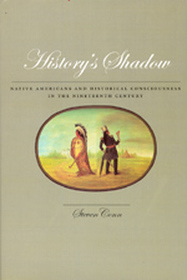
University of Chicago Press
“History’s Shadow is an intelligent and comprehensive look at the place of Native Americans in Euro-American’s intellectual history. . . . Examining literature, painting, photography, ethnology, and anthropology, Conn mines the written record to discover how non-Native Americans thought about Indians.”
—Joy S. Kasson, Los Angeles Times
“History’s Shadow is an intelligent and comprehensive look at the place of Native Americans in Euro-American’s intellectual history. . . . Examining literature, painting, photography, ethnology, and anthropology, Conn mines the written record to discover how non-Native Americans thought about Indians.”
—Joy S. Kasson, Los Angeles Times
Building the Nation
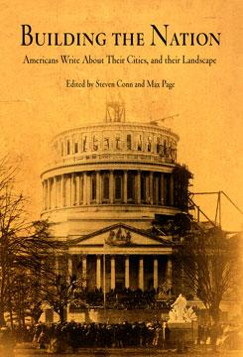
University of Pennsylvania Press
"Some anthologies seem slapdash or opportunistic; others are labors of love, informed by a mastery of a particular field and a passion for sharing the heterogeneous richness of their documents. Building the Nationis happily one of the latter. . . . Vastly useful."
--Preservation Magazine
"Some anthologies seem slapdash or opportunistic; others are labors of love, informed by a mastery of a particular field and a passion for sharing the heterogeneous richness of their documents. Building the Nationis happily one of the latter. . . . Vastly useful."
--Preservation Magazine
Museums and American Intellectual Life
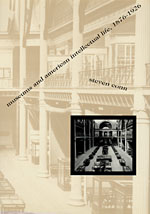
University of Chicago Press
"Steven Conn's masterly study of late-nineteenth century American museums transports the reader to a strange and wonderful intellectual universe.
—Christopher Clarke-Hazlett, Journal of American History
"Steven Conn's masterly study of late-nineteenth century American museums transports the reader to a strange and wonderful intellectual universe.
—Christopher Clarke-Hazlett, Journal of American History
